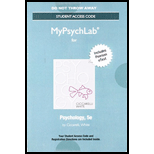
Human development is the study of the different changes which occur throughout the lifespan of a person from birth until death. Differences in the age group of people cause some challenges in the developmental research as the age of people in a study must be an independent variable and people cannot be randomly assigned to various age groups. Longitudinal, cross-sectional and sequential designs are used in the research of age-related changes.
Answer to Problem 1TY
Correct answer:
The people who survived the “Depression” of the 1930s were completely changed by their thinking and attitudes. This is an example of a cohort effect. Therefore, option a. is correct.
Option a. is given as “cohort effect”.
Explanation of Solution
Reason for the correct statement:
Cohort effect is defined as the developmental impact that occurs among a group of people who share a common time period or life experience. For example, the people of 1930s who were born in similar time period and have survived a similar event such as depression phase, due to their thinking and attitude shared similar developmental life span. This is an example of cohort effect.
Hence, option a. is correct.
Reasons for the incorrect statements:
Option b. is given as “cultural group”.
Cultural group is that group of people who share similar culture. Culture is a set of similar practices, beliefs, and behavior shared by different groups. The people who survived the “Depression” of 1930s are not the example of cultural group. Hence, it is a wrong answer.
Option c. is given as “longitudinal group”.
Longitudinal group is that particular group which is followed and evaluated at different set of times as the group under study ages. Due to thinking and attitude, people of 1930s shared similar developmental life span which is an example of cohort effect. Hence, it is a wrong answer.
Option d. is given as “cross-sequential group”.
Cross sequential study involves the research based on combination of cross-sectional and longitudinal group. Cross-sectional group is that set of different groups which is studied at the same time. Due to “thinking and attitude”, people of 1930s shared similar developmental lifespan which is not a cross-sequential group. It is an example of cohort effect. Hence, it is a wrong answer.
Hence, options b., c., and d. are incorrect.
Different people sharing a similar developmental life span in selected time period due to similar life events or similar birth time period is a cohort group and an example of cohort effect.
Want to see more full solutions like this?
Chapter 8 Solutions
MyLab Psychology with Pearson eText - Standalone Access Card - for Psychology (5th Edition)
 Ciccarelli: Psychology_5 (5th Edition)PsychologyISBN:9780134477961Author:Saundra K. Ciccarelli, J. Noland WhitePublisher:PEARSON
Ciccarelli: Psychology_5 (5th Edition)PsychologyISBN:9780134477961Author:Saundra K. Ciccarelli, J. Noland WhitePublisher:PEARSON Cognitive PsychologyPsychologyISBN:9781337408271Author:Goldstein, E. Bruce.Publisher:Cengage Learning,
Cognitive PsychologyPsychologyISBN:9781337408271Author:Goldstein, E. Bruce.Publisher:Cengage Learning, Introduction to Psychology: Gateways to Mind and ...PsychologyISBN:9781337565691Author:Dennis Coon, John O. Mitterer, Tanya S. MartiniPublisher:Cengage Learning
Introduction to Psychology: Gateways to Mind and ...PsychologyISBN:9781337565691Author:Dennis Coon, John O. Mitterer, Tanya S. MartiniPublisher:Cengage Learning Psychology in Your Life (Second Edition)PsychologyISBN:9780393265156Author:Sarah Grison, Michael GazzanigaPublisher:W. W. Norton & Company
Psychology in Your Life (Second Edition)PsychologyISBN:9780393265156Author:Sarah Grison, Michael GazzanigaPublisher:W. W. Norton & Company Cognitive Psychology: Connecting Mind, Research a...PsychologyISBN:9781285763880Author:E. Bruce GoldsteinPublisher:Cengage Learning
Cognitive Psychology: Connecting Mind, Research a...PsychologyISBN:9781285763880Author:E. Bruce GoldsteinPublisher:Cengage Learning Theories of Personality (MindTap Course List)PsychologyISBN:9781305652958Author:Duane P. Schultz, Sydney Ellen SchultzPublisher:Cengage Learning
Theories of Personality (MindTap Course List)PsychologyISBN:9781305652958Author:Duane P. Schultz, Sydney Ellen SchultzPublisher:Cengage Learning





